Check out Samhaine’s Player Tricks: Solving RPG Mysteries. It makes a fantastic companion piece to the Three Clue Rule.
Basically, Samhaine gives you a great overview of techniques players in an RPG can use to solve the mysteries presented to them by the GM. Broadly speaking, he breaks the solving of a mystery into three categories:
Deduction is the one most players are familiar with, particularly from published scenarios, where the players assemble so many clues that there is legitimately only one conclusion that can be drawn from them. The GM doles out unmissable clues as the game progresses (faster or slower depending on how aggressive you are, how your skill checks go, and whether you make bad decisions), and eventually you have enough puzzle pieces that the missing one is completely obvious. Even at its fastest, waiting for clues until you can work up a deduction tends to be really slow.
Induction is most useful at the mid-ranges of an investigation, because you take incomplete evidence and try to extrapolate something that explains it (but which might not be the only thing that explains it). Often, it’s the trick you use for figuring out if there are any other things you need to check before deciding you’ve got it all figured out. It’s your main way to generate falsifiable theories: we know a bunch of things, and it seems likely that X would explain them, but something else could explain them. Let’s figure out how we can prove and disprove X; if we disprove it, we need to think about these other clues in a different way.
Abduction in this context really means brainstorming to come up with logical explanations for clues based on known rules, which give you immediate things to check (such as whether those known rules don’t apply in this case). This is the thing you do when you don’t know much at all yet to try to figure out more things. Abduction is where RPG mysteries really diverge from scripted ones: you can jump the clue sequence pretty much whenever you want by working backwards along what seems like the simplest explanation. “The murderer got into the house somehow. One of the ways he could have gotten into the house was the nearby window. Thus, we can check to see if that’s how he got in!” Hopefully your GM has prepared enough for a lot of this tactic, because it basically means trying to skip straight to the solution using common sense and hoping proving or disproving your theories will at least narrow down the idea space you should be looking at.
And then he drills down into those categories to explore specific tips, consequences, and general fallout. It’s incredibly clever, broadly useful, and very much worth your time.
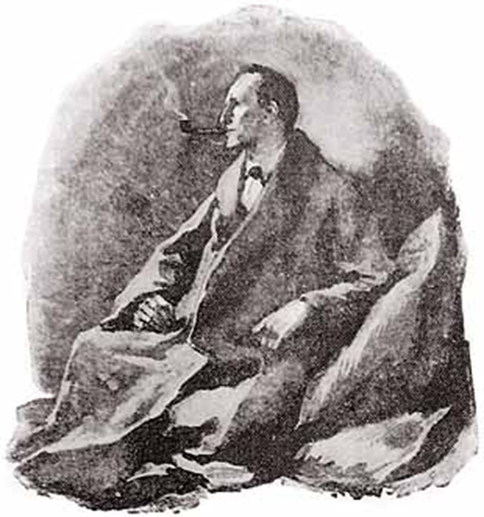
Filed under: Roleplaying Games | Comment (0)
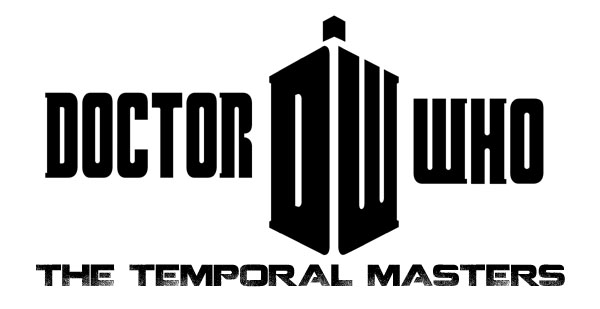
A couple years ago I posted Doctor Who: The Temporal Masters, a fanciful outline of the hypothetical season of Doctor Who I would create if I wanted to craft a villain suitable for replacing the Daleks as a rival for the Time Lords.
Martin Tegelj has taken that material and is doing something incredibly cool with it: He’s designing scenarios for the Doctor Who Roleplaying Game with the aim of turning The Temporal Masters into a full campaign. He’s currently written up the first two installments and posted them online in beautiful, fully-produced PDFs:
Part 1: A Conversion Before Christmas
Part 2: Something Old, Something New
I’m super excited to see how Martin is going to develop the raw material here, and I can already see that he’s adding some really great new ideas. Check ’em out!

Filed under: Roleplaying Games | Comments (3)

You may remember that Places to Go, People to Be translated the Three Clue Rule into French last year. Now they’ve begun translating Node-Based Scenario Design as Création de scénario en noeuds.
Unlike the Three Clue Rule, I have nothing particularly clever to say about this translation. So here’s a semi-interesting factoid about Node-Based Scenario Design: After finishing the original set of essays, I somehow managed to lose the Photoshop file I’d used to create the various multi-colored node diagrams. (This is uncharacteristic for me: I actually have an entire directory dedicated to housing the original work files for the graphics here on the Alexandrian. The directory dates back to when the site launched in 2005 and exists for explicitly this purpose. I still have no idea how I managed to lose the PSD file.) As a result, whenever I’ve done a follow-up on the original series which requires a similar node diagram I have crudely patched it together by copying and pasting the original JPGs.
I keep telling myself that some day I should rebuild the original file. But I also keep telling myself that some day I’ll learn how to use Adobe Illustrator properly so that I stop abusing Photoshop by using it for anything even vaguely graphical.
Filed under: Roleplaying Games, Site News | Comment (0)
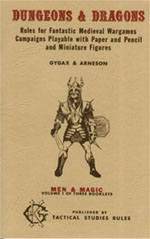
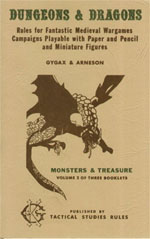
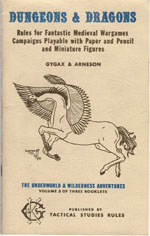
Wizards of the Coast has finally made the PDFs for OD&D available again! For those unfamiliar with the evolution of D&D throughout the years, check out A Nomenclature of D&D Editions. (Which is somewhat out of date at this juncture, but should more than suffice for the current topic.)
If you’re a newer reader here at the Alexandrian, you may be wondering what the fuss is all about. The short version is that exploring the strange nuances of OD&D proved to be an incredibly insightful journey for me, most notably culminating in my understanding of the importance of an Open Gaming Table for roleplaying games. I wrote a number of short articles here at the Alexandrian about my reactions, and if you’d be interested in visiting (or revisiting) those thoughts here are some quick links to explore:
Reactions to OD&D
The Ur-Game
Thinking About Morale
OD&D in the Caverns of Thracia
Ranged Combat
Prime Requisites
The Scope of the Game
OD&D Character Sheets
Gygaxian Rulebooks
Experience Points
Encounter Probability
Size Does Matter?
Turns, Rounds, and Segments… Oh My!
Bachelor Party OD&D
(Re-)Running the Megadungeon
The Intemperate Jungle
My Favorite Character Sheet
Keep on the Borderlands – Factions in the Dungeon
Treasures Maps & The Unknown: Goals in the Megadungeon
Wandering Adventures
Interesting Facts About the Blood Shield Bandits
Untested: Reserve Items
Vampires as Lycanthropes
Untested: At Death’s Door
The Ruined Temple of Illhan
The Subtle Shifts in Play
Turn Undead in Blackmoor
You might also find these interesting:
Gary Gygax’s House Rules for OD&D
Justin’s House Rules for OD&D
Filed under: Roleplaying Games | Comment (1)

Places to Go, People to Be has translated the Three Clue Rule into French as La Règle des Trois Indices!
I can’t read a word of it, but it does remind me that in French the word for “clue” is the same word as “indication” — i.e., it is something which indicates something else. (I think I first encountered this when reading essays about the Arsène Lupin stories.) That seems like a particularly useful bit of alternative etymology in the particular context of the Three Clue Rule (or Three Indication Rule), since the rule can actually be applied widely beyond the format of a mystery.
(For those curious, the English word “clue” derives from “clew”, which originally referred to a ball of thread: Just as Ariadne’s thread led Theseus to the entrance of the labyrinth, so clues will lead you to the solution of the mystery. The example of the labyrinth, I suppose, just indicates another way in which the provenance of the Three Clue Rule can be extended.)
Filed under: Roleplaying Games, Site News | Comment (1)


















